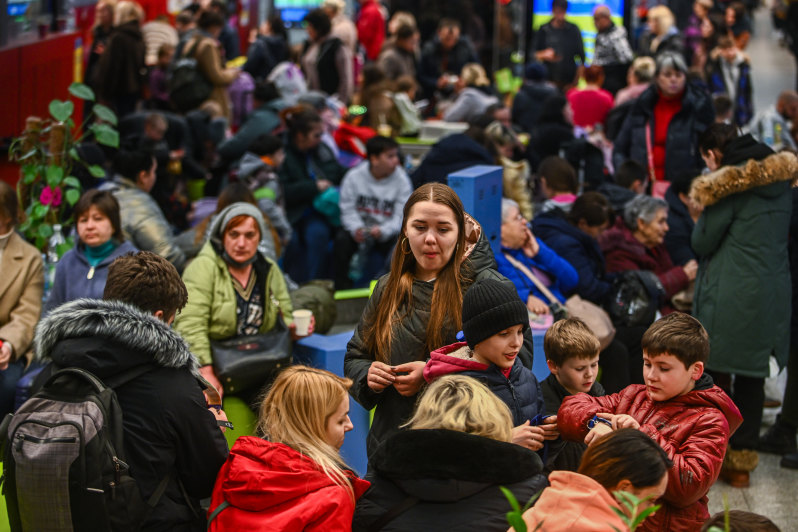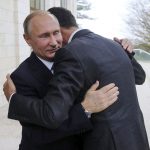In 2015, Hungarian Prime Minister Viktor Orban was being labelled “Orban the Awful” and his country “Fortress Hungary” because of his anti-refugee policies. Lately, he has been “opening his arms” to Ukrainian refugees fleeing Putin’s invasion.
In the arc of this seven-year period, a lot can be learned about the global response to providing refuge to those in need. And most of it isn’t heartening.
First, we need to recognise there are clear logistical differences between Ukrainian refugees and, say, those from the Middle East or Africa.
Ukrainians are allowed to enter Europe freely on 90-day visas under existing European Union law. A further point is that a high proportion of asylum seekers tend to be male. Due to Ukraine’s law disallowing men aged 18 to 60 leaving the country – because they are needed to defend their country – most Ukrainian refugees are women and children.
There is also a kind of grim camaraderie. Ukrainians have suffered under Russian dictatorship but Moscow’s heavy hand is a presence across all of Eastern Europe.
While such factors can be acknowledged, the underlying reason for some 3 million Ukrainian refugees being “processed” (such an inhuman term) so efficiently – relatively – draws on a simple and troubling truth: they look the same.
Since the Russian invasion on February 24, it has been sobering to observe how differently the conflict has been portrayed compared with, say, the Syrian, Yemeni or Afghan wars.
Journalist Lorraine Ali, writing in the Los Angeles Times, noted that commentators “who’d previously addressed conflicts in the Gulf region, often with a focus on geopolitical strategy and employing moral abstractions, appeared to be empathising for the first time with the plight of civilians (in Ukraine)“.Advertisementhttps://c071ffb429d60b11db3094ff10a67398.safeframe.googlesyndication.com/safeframe/1-0-38/html/container.html
Journalist Phillipe Corbe put it plainly on France’s BFM TV: “We’re not talking here about Syrians fleeing the bombing of the Syrian regime backed by Putin. We’re talking about Europeans leaving in cars that look like ours to save their lives.” The London Telegraph’s Daniel Hannan remarked: “They seem so like us. That is what makes it so shocking.” And CBS’s Charlie D’Agata said: “This is a relatively civilised, relatively European … city, one where you wouldn’t expect that or hope that it’s going to happen.”https://www.youtube.com/embed/lhLqUY1OZ_M
They might wish to be excused for becoming emotional in the moment, yet their respective faux pas reveal a demonstrable bias that is denying the same kind of empathetic reporting to many other people seeking help in a troubled world. According to the United Nations High Commissioner for Refugees, more than 82 million people were forcibly displaced worldwide at the end of 2020. About 26 million are classified as refugees, most from five countries: Syria, Venezuela, Afghanistan, South Sudan and Myanmar.
For decades, uncountable barriers have been thrown up to deter refugees. Even those who find refuge are commonly put through hell. Asylum seekers can expect to live in limbo – denied full national rights in-country – for as long as 25 years, says Serena Parekh, author of No Refuge: Ethics and the Global Refugee Crisis.
All because, we are told, countries cannot cope with large numbers of asylum seekers. Not even rich countries.
The Ukraine crisis exposes this excuse as a myth. The Ukraine crisis makes clear that, absent unnecessary bureaucracy, large numbers of refugees can be “processed” relatively efficiently.

Tragically, even as European Ukrainian refugees are openly accepted into bordering countries, Africans who have been living in Ukraine have been given very different treatment, including being prevented from leaving the war-torn country.
All those fleeing Vladimir Putin’s violence deserve every demonstration of compassion the world can muster. But they are not alone. Unwittingly, the spotlight on them has cast light on the way many people seeking asylum around the world are treated. Might we be shocked enough to respect our common humanity more deeply?
By Perry Q Wood – lawyer and council member of the Australian Institute of International Affairs.
Source: Sydney Morning Herald



